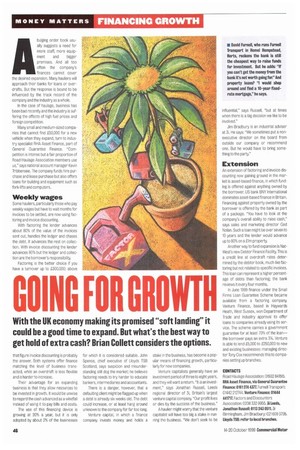GOING FOR GRO
Page 48

If you've noticed an error in this article please click here to report it so we can fix it.
With the UK economy making its promised "soft landing" it could be a good time to expand. But what's the best way to get hold of extra cash? Brian Collett considers the options.
Abulging order book usually suggests a need for more staff, more equip
ment and bigger premises. And all too often the company's finances cannot cover the desired expansion. Many hauliers will approach their banks for loans or overdrafts. But the response is bound to be influenced by the track record of the company and the industry as a whole.
In the case of haulage, business has been bad recently and the industry is suffering the effects of high fuel prices and foreign competition.
Many small and medium-sized companies that cannot f nd ,250,000 for a new vehicle when they expand, turn to industry specialist PHA Asset Finance, part of General Guarantee Finance. "Competition is intense but a fair proportion of Road Haulage Association members use us." says national account manager Kevin Tribbensee. The company funds hire purchase and lease purchase but also offers loans for building and equipment such as fork-lifts and computers.
Weekly wages
Some hauliers, particularly those who pay weekly wages but have to wait months for invoices to be settled, are now using factoring and invoice discounting.
With factoring the lender advances about 80% of the value of the invoices sent out, handles the ledger and chases the debt. It advances the rest on collection. With invoice discounting the lender advances 80% but the ledger and collection are the borrower's responsibility.
Factoring is the better choice if you have a turnover up to £300,000; above that figure invoice discounting is probably the answer. Both systems offer finance matching the level of business transacted, while an overdraft is less flexible and is harder to increase.
Their advantage for an expanding business is that they allow resources to be invested in growth. It would be unwise to regard the cash advanced as a windfall instead of us414 it to pay bills and costs.
The use of this financing device is growing at 20% a year, but it is only adopted by about 2% of the businesses for which it is considered suitable. John Spence, chief executive of Lloyds TSB Scotland, says suspicion and misunderstanding still dog the market; he believes factoring needs to try harder to educate bankers, intermediaries and accountants.
There is a danger, however, that a defaulting client might be flagged up when a debt is already six weeks old. The debt could increase, or at least hang around unknown to the company for far too long.
Venture capital, in which a finance company invests money and holds a stake in the business, has become a popular means of financing growth, particularly for new companies.
Venture capitalists generally have an investment period of three to eight years, and they will want a return. it is an investment," says Jonathan Russell, Leeds regional director of 31, Britain's largest venture capital company "Our profit lives or dies by the success of the business."
A haulier might worry that the venture capitalist will have too big a stake in running the business. "We don't seek to be influential," says Russell, "but at times when there is a big decision we like to be involved."
Jim Bradbury is an industrial adviser at 3i. He says: "We sometimes put a nonexecutive director on the board from outside our company or recommend one. But he would have to bring something to the party"
Extension
An extension of factoring and invoice discounting now gaining ground in the market is asset-based finance, in which funding is offered against anything owned by the borrower. US bank BNY International dominates asset-based finance in Britain. Financing against property owned by the borrower is offered by the bank as part of a package. "You have to look at the company's overall ability to raise cash," says sales and marketing director Ged Nolan. Such a loan might be over seven to 10 years and the lender would advance up to 80% on a property.
Another way to fund expansion is NatWest's new Debtor Finance Facility This is a credit line at overdraft rates determined by the debtor book, much like factoring but not related to specific invoices. This loan can represent a higher percentage of debts than factoring; the bank reviews it every four months.
In June 1999 finance under the Small Firms Loan Guarantee Scheme became available from a factoring company Venture Finance, based in Haywards Heath, West Sussex, won Department of Trade and Industry approval to offer loans to companies already using its service. The scheme carries a government guarantee for at least 70% of the loan— the borrower pays an extra 3%. Venture is able to lend £5,000 to £250,000 to new and existing businesses: managing director Tony Cox recommends this to companies setting up branches.
CONTACTS Road Haulage Association: 01932 841515. MA Asset Finance, via General Guarantee Finance:0161 274 4377. Eurnell Transport 61442 212744. Venture Finance: 01444 441717. Factors and Discounters Association: 0208 332 9955. 3i Leeds, Jonathan Russell: 0113 243 0511. Si Birmingham, Jim Bradbury: G21609 3705. Uoyds TSB: refer to local branches.












































































































